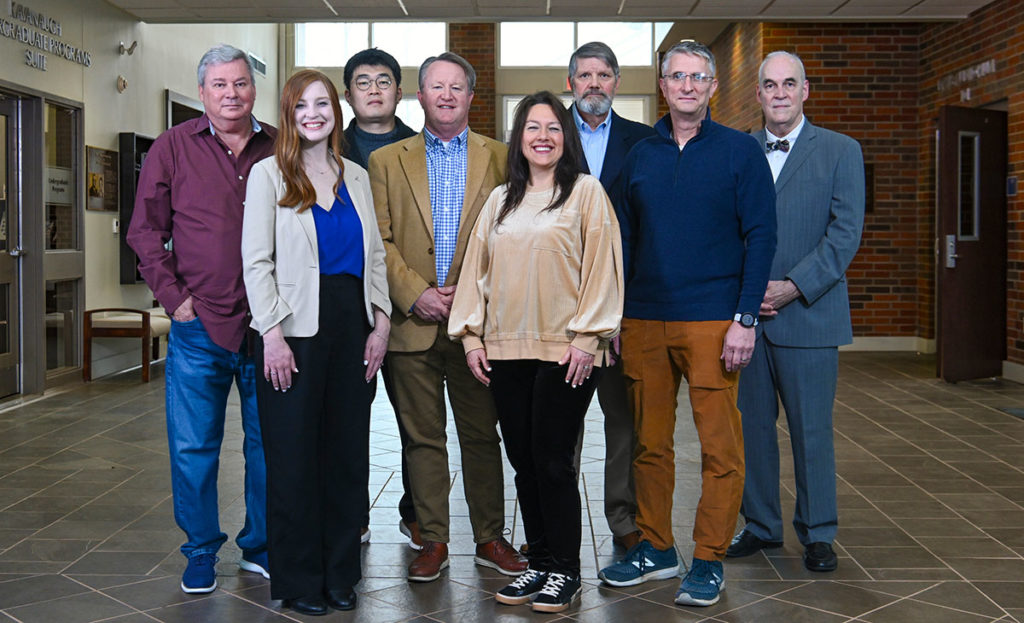Technology — along with entrepreneurship and innovation — is strategically woven throughout every aspect of Louisiana Tech’s College of Business. As new and emerging technologies arise, the College’s Center for Information Assurance is utilizing AI and analytics to stand at the forefront of solving cybersecurity-related problems.
Just last year, the Center for Information Assurance achieved two significant milestones that led to increased recognition in cybersecurity research and teaching. The Center earned the prestigious re-designation as a National Center of Academic Excellence in Cyber Research (CAE-R) by the National Security Agency (NSA) and received a $500,000 anonymous gift to support ongoing high-impact research and education.
Tech is one of only 46 institutions nationwide — and the only one in Louisiana — to hold designations as both a CAE in Cyber Research and a CAE in Cyber Defense Education.
“Our CAE designations serve as external validation that our faculty and Ph.D. students are conducting interdisciplinary research that solves our nation’s most challenging cybersecurity problems,” said Dr. Selwyn Ellis, director of the Center for Information Assurance and chair of the department of computer information systems. “This effort spans four of Louisiana Tech’s colleges. It was that collaboration, spearheaded by our tremendous College of Business faculty, that allowed us to achieve the re-designation.”
The Center has been continuously credentialed as a CAE since 2009, a status that reflects an interdisciplinary, collaborative approach to cybersecurity education while fostering significant community involvement, academic activities, and institutional practices in cybersecurity.
In addition to being leaders in the field of information assurance research, CIS faculty regularly partner with civic organizations, schools, and professional groups to educate community members on the latest trends in the cyber world.

“Our students benefit from having these top researchers as their professors and mentors,” said Dr. Chris Martin, dean of the College of Business. “They are authoring CIS textbooks, chairing the most notable conferences in the field, and serving as subject matter experts across the globe. Their expertise allows our NSA-certified curriculum to be market-responsive, producing well-trained and capable information assurance and cybersecurity experts.”
Merging the fields of AI, cybersecurity, and data analytics creates a powerful synergy that reshapes how organizations can protect, analyze, and leverage their data, and the Center for Information Assurance serves as a hub that works to integrate the three through faculty research and classroom teaching.
“Through our curriculum, students learn to leverage technology in business to its fullest,” Martin said. “We strive to tailor our curriculum to the needs of industry partners and an ever-evolving workforce. Businesses are embracing generative AI and utilizing analytics to become more efficient and effective. We want our students to be prepared — just as they are with current technology.”
New certificates in data analytics at the undergraduate and graduate level were developed, and the College now embeds AI content in a number of courses, including core classes like CIS 125: IT Solutions for Business and CIS 310: Principles of Information Systems.
“My personal view is that it is a losing game to try to prevent AI use. We need to teach students and workers how to use generative AI ethically, effectively, and safely,” said Dr. Craig Van Slyke, Mike McCallister Eminent Scholar Chair in Information Systems. “A large part of this is related to helping people understand the risks and benefits of AI.”
One activity CIS faculty designed helps students learn to refine results through a chain of prompts. Students also learn to use ChatGPT for specific learning-related tasks, such as brainstorming ideas and acting as a study partner or a tutor.
As faculty and students alike begin to explore the challenges and possibilities of generative AI in the classroom, research by faculty in the Center for Information Assurance continues to provide relevant guidance on what could become, in Van Slyke’s words, “as disruptive as e-commerce was in the late 1990s through the early 2000s.”
“Although no one knows the extent of the impact of generative AI systems yet, it is clear that the impacts will be significant,” Van Slyke said. “We need to prepare students to live in a world that’s heavily influenced by generative AI systems.”
